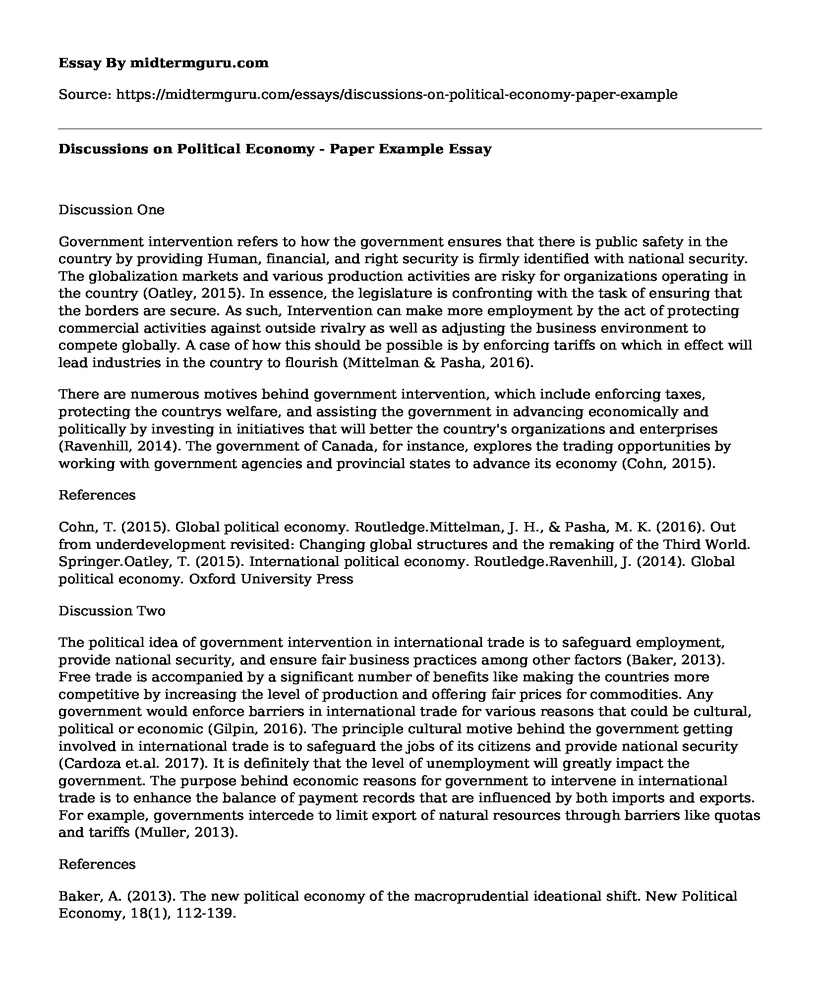Discussion One
Government intervention refers to how the government ensures that there is public safety in the country by providing Human, financial, and right security is firmly identified with national security. The globalization markets and various production activities are risky for organizations operating in the country (Oatley, 2015). In essence, the legislature is confronting with the task of ensuring that the borders are secure. As such, Intervention can make more employment by the act of protecting commercial activities against outside rivalry as well as adjusting the business environment to compete globally. A case of how this should be possible is by enforcing tariffs on which in effect will lead industries in the country to flourish (Mittelman & Pasha, 2016).
There are numerous motives behind government intervention, which include enforcing taxes, protecting the countrys welfare, and assisting the government in advancing economically and politically by investing in initiatives that will better the country's organizations and enterprises (Ravenhill, 2014). The government of Canada, for instance, explores the trading opportunities by working with government agencies and provincial states to advance its economy (Cohn, 2015).
References
Cohn, T. (2015). Global political economy. Routledge.Mittelman, J. H., & Pasha, M. K. (2016). Out from underdevelopment revisited: Changing global structures and the remaking of the Third World. Springer.Oatley, T. (2015). International political economy. Routledge.Ravenhill, J. (2014). Global political economy. Oxford University Press
Discussion Two
The political idea of government intervention in international trade is to safeguard employment, provide national security, and ensure fair business practices among other factors (Baker, 2013). Free trade is accompanied by a significant number of benefits like making the countries more competitive by increasing the level of production and offering fair prices for commodities. Any government would enforce barriers in international trade for various reasons that could be cultural, political or economic (Gilpin, 2016). The principle cultural motive behind the government getting involved in international trade is to safeguard the jobs of its citizens and provide national security (Cardoza et.al. 2017). It is definitely that the level of unemployment will greatly impact the government. The purpose behind economic reasons for government to intervene in international trade is to enhance the balance of payment records that are influenced by both imports and exports. For example, governments intercede to limit export of natural resources through barriers like quotas and tariffs (Muller, 2013).
References
Baker, A. (2013). The new political economy of the macroprudential ideational shift. New Political Economy, 18(1), 112-139.
Cardoza, G., Fornes, G., Farber, V., Duarte, R. G., & Gutierrez, J. R. (2016). Barriers and public policies affecting the international expansion of Latin American SMEs: Evidence from Brazil, Colombia, and Peru. Journal of Business Research, 69(6), 2030-2039.
Gilpin, R. (2016). The political economy of international relations. Princeton University Press.Muller, J. (2013). Mississippian political economy. Springer Science & Business Media.Discussion Three
Various countries practice open trade; however, there are reasons why governments limit free trade in a country especially when they discover the country is underachieving, alongside the reason why governments have a tendency to impose limitations these constraints with regards to political, monetary, and social right (Anderson, 2016). Regardless of whether these reasons include ensuring employment, safeguarding national security, ensuring new enterprises or the insurance of national attributes as it is done for the advantage of the country and its economy (Egan & Guimaraes, 2017).
Ways in which the governments force these restrictions are framing taxes (assessments) and imports and now and then even fares, there are two types of duties; one is imposed on imported goods as fixed charges as well as taxes that are variable of the imported goods. Another way is subsidizing, where governments support household manufacturing items by offering goods by reducing tax as well as low-premium goods (Amavilah et.al. 2014). Also, the government can issue import quotas are by governments by applying lower taxes on imports up to a specific number governments are then ready to expand the charges essentially once the imports have gone over the standard (Walter, 2016). The government also imposes rules that restrict dumping of goods.
References
Amavilah, V. H. S., Asongu, S. A., & Andres, A. R. (2014). Globalization, peace & stability, governance, and knowledge economy.Anderson, K. (2016). Introduction and summary. In Agricultural Trade, Policy Reforms, and Global Food Security (pp. 1-18). Palgrave Macmillan US.
Egan, M., & Guimaraes, M. H. (2017). The Single Market: Trade Barriers and Trade Remedies. JCMS: Journal of Common Market Studies, 55(2), 294-311.
Walter, S. (2016). The emergence of product certification systems as trade barriers (Doctoral dissertation).
Cite this page
Discussions on Political Economy - Paper Example. (2021, Jul 02). Retrieved from https://midtermguru.com/essays/discussions-on-political-economy-paper-example
If you are the original author of this essay and no longer wish to have it published on the midtermguru.com website, please click below to request its removal:
- The Variance Calculation in Budgeting - Paper Example
- Paper Example on Business in a Global Context
- Annotated Bibliography: Globalization
- Forced Ranking: Analyzing and Improving Workforce Performance - Essay Sample
- Trump Tax Reform: Reducing Taxes and Creating Jobs - Research Paper
- Analysis: Job Design & Evaluation for Hiring Success - Essay Sample
- Softbank and the Dynamic Equity Market - Essay Sample







